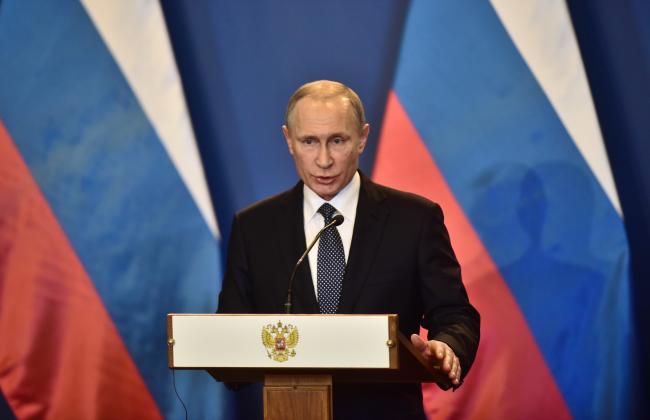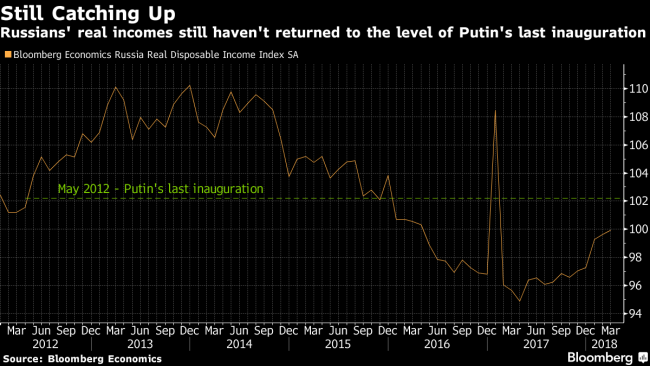(Bloomberg) -- Vladimir Putin was sworn in for the fourth time as president, promising Russians an “economic and technological breakthrough” and reappointing his long-serving prime minister amid the deepest standoff with the West in decades.
Despite Putin’s rhetoric, there’s little appetite in the Kremlin for real changes, according to senior officials, as the growing tension with the U.S. and European Union has strengthened the hand of those arguing for self-reliance and an even greater role for state companies and financing. Those who argued for reducing the conflict in order to focus on economic development are on the defensive after four years of steadily increasing Western sanctions have isolated Russia’s biggest banks and companies from vital financing and technology.
Putin formally asked parliament to confirm Dmitry Medvedev to continue as prime minister, the job he’s held since giving up the presidency to Putin in a job swap executed in 2012. Medvedev is expected to win confirmation easily this week.
Despite the doubling of oil prices over the last two years, Russia has struggled to get its economy back into high gear. Slow growth threatens to reverse Russia’s rise in the ranks of global economies under Putin and undermines the Kremlin’s ability to pay for its military buildup.
Putin is considering appointing Alexei Kudrin, a former finance minister respected by investors for the pro-market overhauls he led in the Russian leader’s first two terms, to a new post to lead efforts to revive economic growth, according to officials familiar with the plans. Kudrin, who has called for easing tensions with the West, would be charged with helping rebuild economic links with the U.S. and Europe.
But in a move that would create a powerful potential counterweight to Kudrin, Putin is considering promoting his economic adviser, Andrey Belousov, a supporter of a strong state role in the economy, to the post of deputy prime minister, according to four government officials.
Domestic Focus
“We must now use all available resources to resolve our most urgent domestic tasks,” Putin, 65, told supporters and officials gathered for the inauguration ceremony in the Kremlin. Six years ago, the capital greeted his motorcade with empty streets. This time, Putin skipped that element, starting the festivities from the Kremlin.
“Over its more than thousand-year history, Russia has repeatedly faced times of troubles and trials and has always been reborn like a phoenix,” he said. Putin’s new term is likely to be his last because of constitutional term limits; he’s already the longest-serving Russian ruler since Josef Stalin.
Putin rode from his Kremlin office to the nearby hall for the inauguration in a black Russian-made stretch limousine for the first time rather than a Mercedes as in the past. He strode up a red carpet flanked by presidential guards dressed in blue and gold-embroidered uniforms to enter the gilt Kremlin hall crowded with guests and dignitaries where he took the oath of office. After the swearing-in ceremony, an artillery salute fired and Putin descended to the courtyard below to mingle with hand-picked supporters.
Public support for Putin remains strong, according to polls, but opposition simmers below the surface. More than 1,600 were detained by police in 27 cities across Russia Saturday at “He’s Not Our Tsar” protests against his nearly two-decade rule, according to activists.
Belousov could take over the role of economic chief from First Deputy Prime Minister Igor Shuvalov, known for his pro-market views and ties to private-sector tycoons. Many of the other top jobs could be filled by the end of this week, officials said.
“Even if Kudrin joins the government, he won’t be able to do much given the current political framework,” said Andrei Kolesnikov, an analyst at the Carnegie Moscow Center. “It will just be running in place.”
The Russian leader is expected to formalize his economic goals in a decree to be signed soon after his inauguration Monday, including a big boost in spending on long-neglected areas like health care, education and infrastructure.
Painful steps, including tax hikes and an increase in the pension age, planned to help cover the cost of the new spending are likely to come later, people familiar with the plans said.
With the latest U.S. sanctions driving affected private companies to demand more state aid, the Kremlin’s economic role is growing.
‘Authoritarian’ Modernization
“The task now is to overcome the technological lag behind the West while surrounded by unfriendly forces abroad,” said Evgeny Minchenko, a Moscow political consultant who works with the Kremlin. Modernization will be “authoritarian,” he said.
At present, while the Kremlin is eager to avoid further increase in geopolitical tensions, there’s no readiness to take a softer line, say Kremlin and government officials. An early test will come in mid-May when parliament takes up a plan for retaliatory measures against U.S. businesses in the wake of the last round of sanctions.
“Moscow doesn’t have any interest in further escalation with the West, which will have negative political and economic consequences for it,” said Andrei Kortunov, head of the Russian International Affairs Council, a research group set up by the Kremlin. “But it’s not prepared to do anything that looks like a one-sided concession.”

